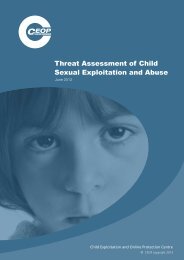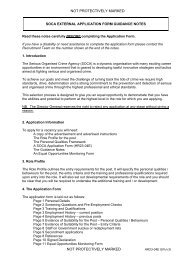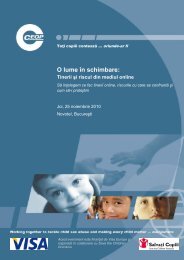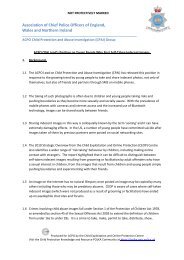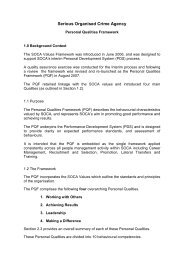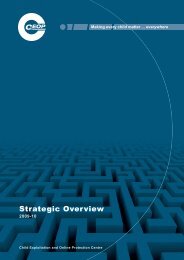The trafficking of women and children from Vietnam - CEOP
The trafficking of women and children from Vietnam - CEOP
The trafficking of women and children from Vietnam - CEOP
Create successful ePaper yourself
Turn your PDF publications into a flip-book with our unique Google optimized e-Paper software.
3.2 Trafficking legislation in <strong>Vietnam</strong><br />
NOT PROTECTIVELY MARKED<br />
New legislation was passed in the National Assembly, on 20 March 2011, but it has not yet<br />
been reflected in the Penal Code. Currently Article 119 (Trafficking in Women) <strong>and</strong> Article<br />
120 (Trading in, Fraudulently Exchanging or Appropriating Children) <strong>of</strong> <strong>The</strong> Penal Code are<br />
used to prosecute the <strong>of</strong>fence <strong>of</strong> buying <strong>and</strong> selling people. <strong>The</strong>re is a general feeling<br />
amongst many NGOs that <strong>of</strong>ten sentences are too light, despite a maximum sentence <strong>of</strong> 20<br />
years imprisonment in relation to <strong>trafficking</strong> <strong>women</strong>, <strong>and</strong> life for child 4 <strong>trafficking</strong>.<br />
To be recognised as a victim <strong>of</strong> <strong>trafficking</strong>, the victim has to be deemed as such by the<br />
authorities in both the destination <strong>and</strong> source country. In <strong>Vietnam</strong>, there are two<br />
competent authorities, depending on where a <strong>trafficking</strong> case is reported. On the l<strong>and</strong> <strong>and</strong><br />
sea borders, the Border Guards’ Comm<strong>and</strong> (Ministry <strong>of</strong> National Defence) is the competent<br />
authority. At international airports, the Ministry <strong>of</strong> Public Security (MPS) is the competent<br />
authority. Where a trafficker can be identified <strong>and</strong> prosecuted, investigations are carried<br />
out by the MPS <strong>and</strong> prosecutions mounted by the Supreme People’s Procuracy (SPP).<br />
3.3 Reintegration, rehabilitation <strong>and</strong> awareness raising<br />
In 2007, the <strong>Vietnam</strong>ese government introduced the Receiving <strong>and</strong> Reintegration<br />
Programme, under law 106 to protect, identify <strong>and</strong> <strong>of</strong>fer assistance to victims. <strong>The</strong> MPS <strong>and</strong><br />
MOLISA work with international organisations <strong>and</strong> NGOs to raise awareness <strong>of</strong> <strong>trafficking</strong> at<br />
a local level through education programs, such as those run by the Women Union’s (WU)<br />
Safer Migration Programme <strong>and</strong> Alliance Anti-Traffic’s (AAT) teacher education programme.<br />
Trafficking shelters, such as Pacific Links Foundation shelter for trafficked girls in Lao Cai,<br />
have been set up to accommodate <strong>and</strong> care for victims. Such shelters, together with<br />
government reintegration programmes, provide vocational training <strong>and</strong> support<br />
mechanisms for victims. <strong>The</strong>se processes are being reviewed for inclusion in the MPS’s<br />
2011 NPA.<br />
Recognised victims are also entitled to legal aid mainly through support in obtaining<br />
permanent residence <strong>and</strong> identity documents for themselves <strong>and</strong> their <strong>children</strong>. Many have<br />
also received legal counselling <strong>and</strong> support in denouncing their traffickers, although some<br />
4 In <strong>Vietnam</strong> a person is considered a child up to the age <strong>of</strong> 16<br />
Page 7 <strong>of</strong> 31



